Презентация Глагол have to

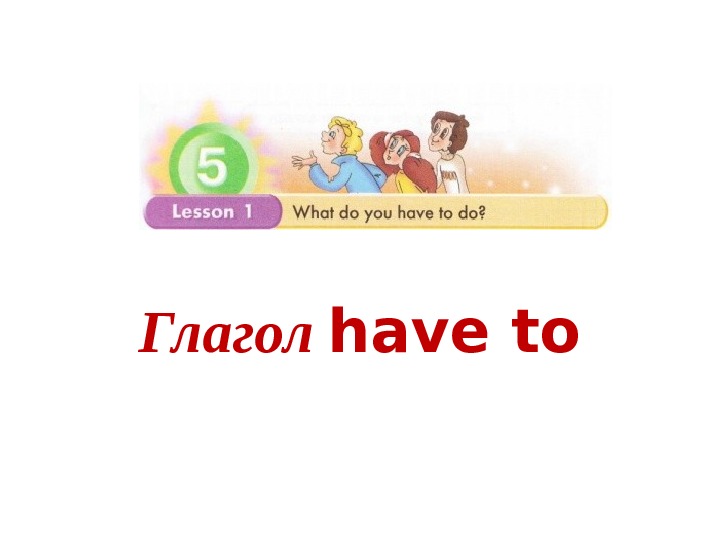




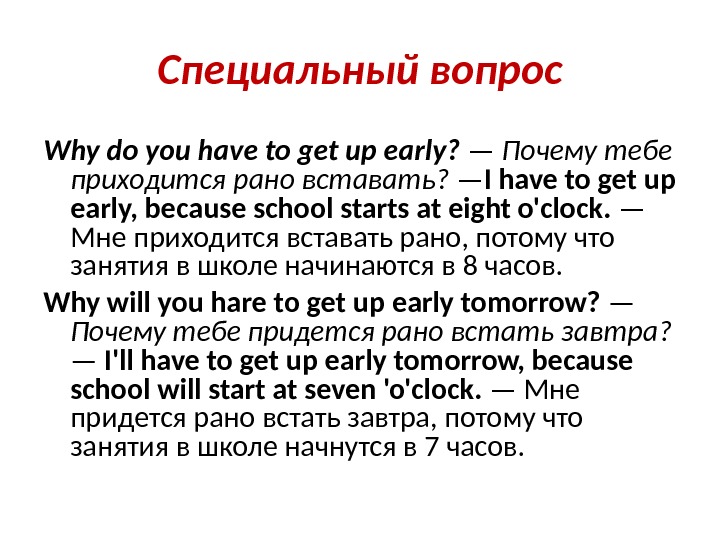

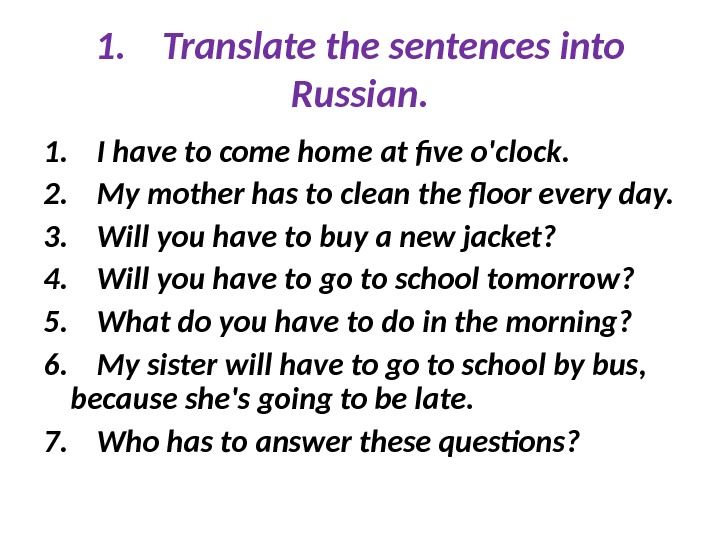
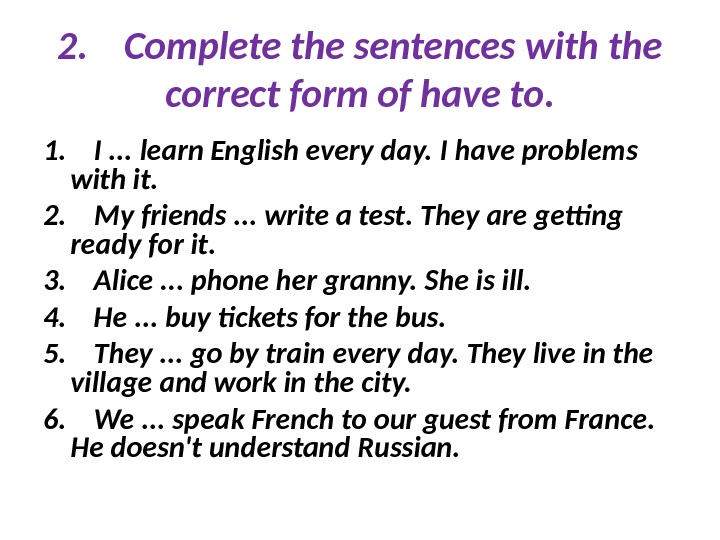
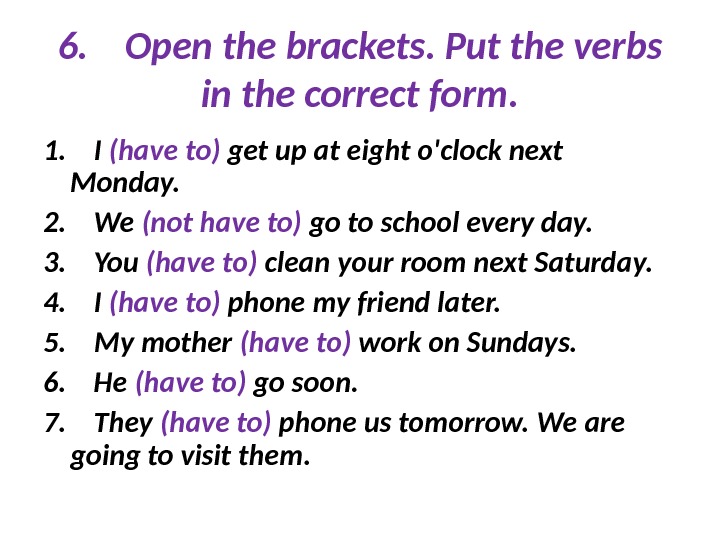
- Размер: 231 Кб
- Количество слайдов: 10
Описание презентации Презентация Глагол have to по слайдам
 Глагол have to
Глагол have to
 Глагол have to употребляется, когда речь идет о необходимости совершения действия в силу определенных обстоятельств. School starts at eight o’clock. I have to get up early. — Занятия в школе начинаются в 8 часов. Мне приходится вставать рано. (От меня это не зависит. ) Не will have to walk his friend’s dog. — Ему придется выгуливать собаку своего друга.
Глагол have to употребляется, когда речь идет о необходимости совершения действия в силу определенных обстоятельств. School starts at eight o’clock. I have to get up early. — Занятия в школе начинаются в 8 часов. Мне приходится вставать рано. (От меня это не зависит. ) Не will have to walk his friend’s dog. — Ему придется выгуливать собаку своего друга.
 Утвердительное предложение I have to get up early. — Мне приходится вставать рано. I ‘ll have to get up early tomorrow. — Мне придется встать рано завтра.
Утвердительное предложение I have to get up early. — Мне приходится вставать рано. I ‘ll have to get up early tomorrow. — Мне придется встать рано завтра.
 Отрицательное предложение Для образования вопросительных и отрицательных предложений сhave to используются вспомогательные глаголы. My granny doesn’t have to get up early. — Моей бабушке не надо рано вставать. My granny won’t have to get up early tomorrow. — Моей бабушке не придется рано вставать завтра.
Отрицательное предложение Для образования вопросительных и отрицательных предложений сhave to используются вспомогательные глаголы. My granny doesn’t have to get up early. — Моей бабушке не надо рано вставать. My granny won’t have to get up early tomorrow. — Моей бабушке не придется рано вставать завтра.
 Общий вопрос Do you have to get up early ? — Тебе приходится рано вставать ? Yes, I do. / No, I don’t. — Да. / Нет. Will you have to get up early tomorrow ? — Тебе придется рано вставать завтра? Yes, I will. / No, I won’t.
Общий вопрос Do you have to get up early ? — Тебе приходится рано вставать ? Yes, I do. / No, I don’t. — Да. / Нет. Will you have to get up early tomorrow ? — Тебе придется рано вставать завтра? Yes, I will. / No, I won’t.
 Специальный вопрос Why do you have to get up early? — Почему тебе приходится рано вставать? — I have to get up early, because school starts at eight o’clock. — Мне приходится вставать рано, потому что занятия в школе начинаются в 8 часов. Why will you hare to get up early tomorrow? — Почему тебе придется рано встать завтра? — I’ll have to get up early tomorrow, because school will start at seven ‘o’clock. — Мне придется рано встать завтра, потому что занятия в школе начнутся в 7 часов.
Специальный вопрос Why do you have to get up early? — Почему тебе приходится рано вставать? — I have to get up early, because school starts at eight o’clock. — Мне приходится вставать рано, потому что занятия в школе начинаются в 8 часов. Why will you hare to get up early tomorrow? — Почему тебе придется рано встать завтра? — I’ll have to get up early tomorrow, because school will start at seven ‘o’clock. — Мне придется рано встать завтра, потому что занятия в школе начнутся в 7 часов.
 Вопрос к подлежащему Who has to get up early? — Кому приходится рано вставать? I do. — Мне. Who’ll have to get up early tomorrow? — Кому придется рано встать завтра? I will. — Мне.
Вопрос к подлежащему Who has to get up early? — Кому приходится рано вставать? I do. — Мне. Who’ll have to get up early tomorrow? — Кому придется рано встать завтра? I will. — Мне.
 1. Translate the sentences into Russian. 1. I have to come home at five o’clock. 2. My mother has to clean the floor every day. 3. Will you have to buy a new jacket? 4. Will you have to go to school tomorrow? 5. What do you have to do in the morning? 6. My sister will have to go to school by bus, because she’s going to be late. 7. Who has to answer these questions?
1. Translate the sentences into Russian. 1. I have to come home at five o’clock. 2. My mother has to clean the floor every day. 3. Will you have to buy a new jacket? 4. Will you have to go to school tomorrow? 5. What do you have to do in the morning? 6. My sister will have to go to school by bus, because she’s going to be late. 7. Who has to answer these questions?
 2. Complete the sentences with the correct form of have to. 1. I. . . learn English every day. I have problems with it. 2. My friends. . . write a test. They are getting ready for it. 3. Alice. . . phone her granny. She is ill. 4. He. . . buy tickets for the bus. 5. They. . . go by train every day. They live in the village and work in the city. 6. We. . . speak French to our guest from France. He doesn’t understand Russian.
2. Complete the sentences with the correct form of have to. 1. I. . . learn English every day. I have problems with it. 2. My friends. . . write a test. They are getting ready for it. 3. Alice. . . phone her granny. She is ill. 4. He. . . buy tickets for the bus. 5. They. . . go by train every day. They live in the village and work in the city. 6. We. . . speak French to our guest from France. He doesn’t understand Russian.
 6. Open the brackets. Put the verbs in the correct form. 1. I (have to) get up at eight o’clock next Monday. 2. We (not have to) go to school every day. 3. You (have to) clean your room next Saturday. 4. I (have to) phone my friend later. 5. My mother (have to) work on Sundays. 6. He (have to) go soon. 7. They (have to) phone us tomorrow. We are going to visit them.
6. Open the brackets. Put the verbs in the correct form. 1. I (have to) get up at eight o’clock next Monday. 2. We (not have to) go to school every day. 3. You (have to) clean your room next Saturday. 4. I (have to) phone my friend later. 5. My mother (have to) work on Sundays. 6. He (have to) go soon. 7. They (have to) phone us tomorrow. We are going to visit them.

